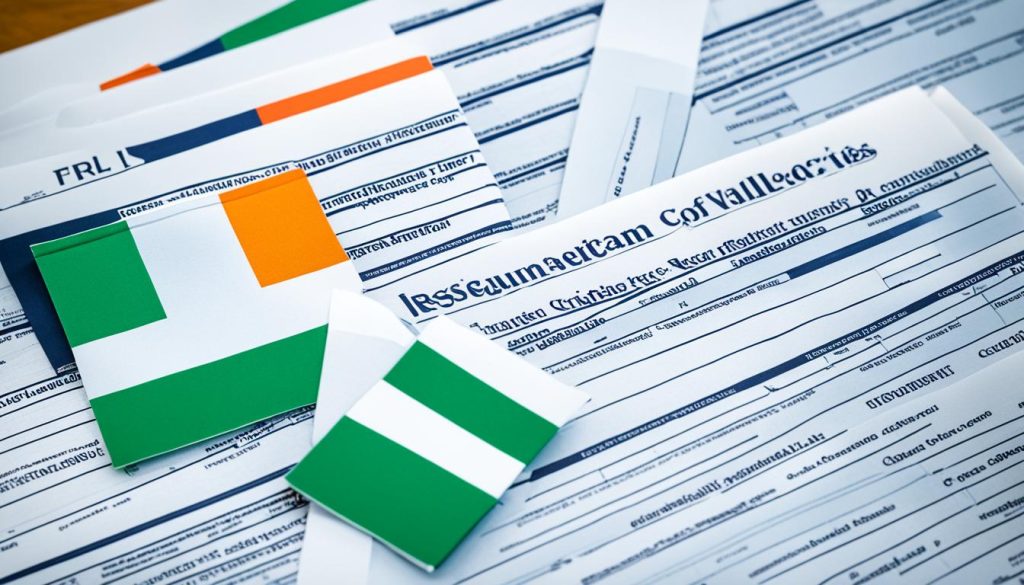It’s vital for companies in Ireland to know the law and regulations. They must follow these to the letter to stay out of trouble and avoid fines. This piece outlines what businesses need to do to comply in Ireland.
- Understanding the Legal Framework for Compliance in Ireland
- Know Your Customer (KYC) Compliance in Ireland
- KYC Compliance Requirements
- Steps to Achieve KYC Compliance in Ireland
- The Role of Compliance Professionals in Ireland
- Importance of Ongoing Monitoring and Reporting in Compliance
- Building an Effective Compliance Program in Ireland
- Compliance and Reputation Management in Ireland
- Benefits of Compliance in Ireland
- The Future of Compliance in Ireland
- Importance of Continuous Professional Development in Compliance
- Key Takeaways for Companies in Ireland
- Conclusion
- FAQ
- Source Links
Key Takeaways:
- Understanding the legal framework is vital for compliance in Ireland.
- Implementing effective KYC compliance measures is crucial.
- Ongoing monitoring and reporting help ensure compliance.
- Building robust compliance programs is essential for companies.
- Continuous professional development is key for compliance professionals.
Understanding the Legal Framework for Compliance in Ireland
For businesses to comply in Ireland, they must know the law. The key law in Ireland is the Criminal Justice (Money Laundering and Terrorist Financing Act 2010). This act meets the EU’s fight against moving money from crime and terror. So, businesses must know and meet these laws to be fully compliant.
Know Your Customer (KYC) Compliance in Ireland
Know Your Customer (KYC) compliance is crucial for financial rules in Ireland. It ensures the financial system’s honesty, stopping money laundering and illegal acts.
Understanding KYC Compliance
KYC compliance means companies check who their customers are. They make sure this through checking customer details. This helps Ireland have a business world that’s safe and clear.
The Irish government set firm rules to ensure KYC is followed. These rules protect against crime and keep Ireland’s financial image strong.
Key Elements of KYC Compliance
Businesses in Ireland follow key steps to obey KYC rules:
- They get good customer info and check their identity with official papers and trusted sources.
- They look at any risks related to customers and transactions to lessen them.
- They watch customer actions closely to find and report any transactions that are strange or suspicious.
- Keeping detailed customer and transaction records is vital for checking and obeying rules.
The Role of Financial Institutions
Banks and similar entities are key to KYC compliance. They must have strong KYC checks and keep an eye on customers to stop financial crimes.
KYC Compliance Challenges
Doing KYC right has its challenges for businesses:
- It’s hard to follow all KYC rules because they involve lots of data and checks.
- Getting KYC right can be costly, needing new tech, training, and ongoing work.
- Making sure customers don’t face long, complex processes while staying compliant is tough.
Benefits of KYC Compliance
Still, KYC does a lot of good, including:
- It stops financial crimes like money laundering and terrorist funding by checking up on customers and their transactions.
- By following KYC, businesses keep their good name and trust with clients and partners intact.
- It makes sure businesses meet the law and don’t get fines for not following the rules.
KYC Compliance Requirements
| Compliance Requirements | Description |
|---|---|
| Customer Identification | Collect and verify customer information and identity documents. |
| Risk Assessment | Conduct risk assessments to identify and mitigate potential risks associated with customers and transactions. |
| Ongoing Monitoring | Regularly monitor customer activity to detect and report any suspicious transactions or behavior. |
| Record-Keeping | Maintain comprehensive records of customer information and transactions for auditing and regulatory purposes. |
Steps to Achieve KYC Compliance in Ireland
Ensuring your business is KYC compliant in Ireland is crucial. It involves a series of necessary steps. These help companies reduce risks and stay within KYC rules. You should:
- Understand the legal framework
- Identify and verify customer info
- Monitor customer activity regularly
- Report any suspicious transactions
- Establish a strong KYC compliance system
It’s vital to note how KYC can stop financial crimes. Following these rules makes the financial system safe. This creates a secure business place in Ireland.
The first step is to grasp the laws on customer checks. Learn about the Criminal Justice (Money Laundering and Terrorist Financing) Act 2010. It’s the foundation for KYC in Ireland. This law fits with the EU’s rules on stopping money laundering, making sure Irish businesses are up to international standards.
Next, companies need to identify and verify their customers. They have to collect key info like names and IDs. Strong identity checks are a must to ensure info is real and accurate.
Businesses then must keep an eye on what customers are doing. They have to watch activity regularly. This helps spot any dodgy money moves or signs of illegal funding. Keeping close tabs lets businesses react fast and report any issues.
Step four is about telling the authorities if you find anything suspicious. Under the rules, businesses must report such activities to the Irish authorities. Quick reporting is key in fighting financial crimes. It enables the authorities to act swiftly and effectively.
Finally, create a full-scale compliance system. This system must cover all KYC needs and include regular staff training. It should adapt to new rules and have a compliance leader. A solid program helps businesses keep up with changes and handle compliance smoothly.
In summary, KYC compliance in Ireland requires specific actions. Knowing the law, verifying customers, watching their activity, reporting anything strange, and having a robust system are key. These steps help businesses lower risks and stick to KYC rules. This effort makes Ireland’s financial world safer and more transparent.
The Role of Compliance Professionals in Ireland
Compliance professionals are key to making sure companies in Ireland follow the law. They work with the management to keep risks low and the company running well. This includes putting in place and looking after rules, checking risks, and keeping track of law changes.
They work ahead to help companies deal with the many laws in Ireland. This keeps companies legal and safe from risks. Compliance pros support teams inside the company to follow the rules rightly. They’re always ready to help, sharing what they know to keep the company on the right side of the law.
They are in charge of setting up and looking after rules. This can include making company rules, checking inside the company, and teaching staff about their roles in keeping things lawful. Compliance pros also talk with outside groups like inspectors and checkers to make sure everything follows the rules.
Finding and tackling risks inside the company is very important for them. They look for issues, see where the company might not be following rules, and then make plans to fix these problems. By finding and fixing issues before they become big, they help keep the company’s name good and away from fines or bad words.
Key Responsibilities of Compliance Professionals in Ireland
- Implementing and maintaining compliance programs
- Conducting risk assessments
- Staying up-to-date with regulatory changes
- Providing guidance and support to internal teams
- Collaborating with external stakeholders, such as regulators and auditors
- Conducting internal audits
- Training employees on compliance responsibilities
- Ensuring ongoing compliance monitoring
In short, compliance experts in Ireland are vital in making sure companies do the right things. They guide companies through tricky rules, set up good rules, check for risks, and make sure everyone keeps following the rules. In this way, they help make the business world in Ireland a place of trust and responsibility.
| Responsibilities | Description |
|---|---|
| Implementing and maintaining compliance programs | Developing policies and procedures, conducting internal audits, and training employees on compliance responsibilities. |
| Conducting risk assessments | Assessing potential risks and vulnerabilities, identifying compliance gaps, and developing strategies to mitigate those risks. |
| Staying up-to-date with regulatory changes | Monitoring regulatory updates and ensuring the company adapts to new compliance requirements. |
| Providing guidance and support to internal teams | Supporting employees in understanding and adhering to compliance standards. |
| Collaborating with external stakeholders | Working with regulators and auditors to ensure compliance with regulatory obligations. |
| Conducting internal audits | Performing internal audits to assess compliance levels and identify areas for improvement. |
| Training employees on compliance responsibilities | Providing training and educational resources to ensure employees understand their compliance obligations. |
| Ensuring ongoing compliance monitoring | Implementing processes to monitor ongoing compliance and detect any non-compliant activities. |
Importance of Ongoing Monitoring and Reporting in Compliance
Ongoing monitoring and reporting are crucial in keeping with laws in Ireland. Businesses need strong systems to check on what their customers are doing. This helps catch any dodgy activities early, showing up possible financial crimes.
Letting the right people know about these suspicions is a must. It’s not just a rule; it fights against money laundering and keeps the financial system clean in Ireland. The Crime Act of 2010 makes it clear that businesses have to report anything they find suspicious.
Keeping an eye on things and reporting them shows a business is serious about following the rules. It’s a key step in stopping money laundering, fraud, and supporting the fight against terrorism.
Actively monitoring and reporting does more than meet a legal requirement. It also helps a business keep its good name by finding and fixing any rule-breaking early. This builds trust with customers and investors.
It also makes a business’s compliance programmes work better. By always looking at what customers are up to, a business can spot issues early. This lets them take quick action to avoid problems.
Benefits of Ongoing Monitoring and Reporting:
- Early detection and prevention of financial crimes
- Mitigation of compliance risks
- Protection of the organization’s reputation and credibility
- Enhanced trust and confidence from customers and stakeholders
- Improved effectiveness of compliance programs
Technology can make ongoing monitoring and reporting a lot easier. It offers tools for quick analysis and updates on customer activities. This speed in responding is essential for stopping problems before they grow.
In conclusion, watching what’s happening and reporting it is key in following the law in Ireland. Good systems help businesses notice suspicious activities. This is a part of fighting financial crimes and keeping the financial system safe.
| Benefits of Ongoing Monitoring and Reporting |
|---|
| Early detection and prevention of financial crimes |
| Mitigation of compliance risks |
| Protection of the organization’s reputation and credibility |
| Enhanced trust and confidence from customers and stakeholders |
| Improved effectiveness of compliance programs |
Building an Effective Compliance Program in Ireland
Companies in Ireland need to make sure they follow the rules set by the government. To do this well, they have to put in place a good compliance program. This helps them deal with risks, stay honest, and keep up with changing rules.
Risk Assessment
First, you must look closely at the risks your business faces. This means finding the things that could go wrong in your industry. Then, you can make plans to avoid or deal with these risks.
Customer Due Diligence
Knowing who your customers are is very important in Ireland. A strong system to check customers keeps your customer info correct and current. This system also catches any strange activities early.
Regular Reviews and Updates
Laws and rules are always changing. So, it’s key to keep your compliance program fresh. Keep an eye on the laws and update your rules and ways to follow them. This keeps your program working well.
Clear Policies and Procedures
Having easy-to-understand rules and ways to follow them is vital for sticking to the law. These rules should say what your staff needs to do. Make sure everyone knows these rules and what’s expected of them through training.
Partnerships with Regtech Experts
Using the right technology can make sticking to the rules easier. Working with tech companies who understand laws (regtech) can be a big help. Their tools can make following the rules more automatic and less risky.
| Key Components | Description |
|---|---|
| Risk Assessment | Identify and mitigate potential risks |
| Customer Due Diligence | Verify customer information and monitor for suspicious activity |
| Regular Reviews and Updates | Stay informed about regulatory changes and update policies |
| Clear Policies and Procedures | Establish guidelines for consistent compliance |
| Partnerships with Regtech Experts | Utilize technology solutions for efficient compliance management |
Setting up a strong compliance program with these key parts helps companies in Ireland. It makes it easier to follow the many rules, keeps them in line with laws, and protects their business.
Compliance and Reputation Management in Ireland
Compliance matters for businesses in Ireland’s reputation. It shows they follow rules. By doing this, they tell everyone they are trustworthy and committed to being good. This makes customers and others trust them more. It also helps keep the Irish finance world honest.
The Importance of Compliance
For Irish businesses, keeping up with laws is key. It tells people they run their operations properly and legally. This builds trust with customers and partners. They know the business is doing things the right way.
Benefits of Compliance
Sticking to laws is more than just legal duty. It helps with reputation. When customers see a company follows rules, they feel more comfortable dealing with them. A good name brings in new customers and keeps the old ones.
Also, following rules helps avoid fines and bad publicity. If a company doesn’t comply, it could face heavy fines and a damaged reputation. So, keeping up with rules is very important to avoid these problems.
Contributing to the Financial System
Compliance aids in keeping Ireland’s financial world straight. It fights things like money laundering and fraud. This makes the financial system fair and clear, which helps all of Ireland’s economy.
Benefits of Compliance in Ireland
Compliance in Ireland is very good for businesses in finance. It helps make a safe and secure place for business. This is good for the company and its customers. They know their money and information are safe.
Being compliant means you follow laws and rules. This stops you from getting fines and bad press. It also shows others you do business in an ethical way. It helps keep the financial world stable and clear.
Being compliant in Ireland makes the financial system better. It adds to everyone’s confidence in the Irish financial sector. This is because companies work together to follow the rules. They keep things steady and open.
Good compliance builds a business’s good name. In finance, this is crucial. It shows you are to be trusted. That you do business in a good way. Compliance means following rules well. By doing this, you stand out and keep customers coming.
Key Benefits of Compliance in Ireland:
- Creates a safe and secure business environment
- Fosters trust with customers
- Reduces the risk of penalties and reputational damage
- Contributes to the overall integrity of the financial system
- Helps businesses build a strong reputation
To sum up, compliance in Ireland has lots of plus points. It makes business safe and builds trust with customers. It lowers the chance of getting into trouble. And it makes the finance world better for all. Being compliant is great for a company’s image. It says you are honest and dependable in the market.
The Future of Compliance in Ireland
The compliance scene in Ireland is changing fast. New rules and tech are molding businesses. Companies in Ireland must keep up with these shifts to stay on the right side.
Regulatory technology, or regtech, is the buzz. It offers tools to tackle the growing regulatory demands. With AI and automation, it makes compliance easier and more accurate.
Regtech brings a lot to the table. It helps companies meet updated rules quickly. It points out any compliance gaps early on, cutting down risks.
It also kicks data insights up a notch for better risk and compliance understanding. This means smarter moves can be made to improve the program.
The tech wave in compliance is set to get bigger. Blockchain and data encryption will play a bigger role. They will secure important compliance data, making processes more transparent and trustworthy.
The Potential Impacts of Technological Advancements on Compliance:
- Getting rid of repetitive compliance tasks to focus on bigger goals
- Making compliance reports more accurate and efficient
- Bolstering risk management with deep analytics and models
- Cutting down costs linked to manual chores
- Building more trust and openness in regulatory dealings
As rules change in Ireland, tech is key for compliance. Businesses need to adopt new tools and stay in the loop. By doing so, they can lead in a tightly regulated world.
| Regulatory Landscapes | Technological Advancements |
|---|---|
| Increased complexity and frequent changes | Artificial Intelligence |
| Stricter enforcement and penalties | Machine Learning |
| Heightened focus on data privacy and security | Automation |
| Greater collaboration between regulators and businesses | Blockchain |
Importance of Continuous Professional Development in Compliance
In Ireland, compliance professionals value continuous professional development (CPD) highly. CPD keeps them up to date with changing regulations and industry practices. It helps professionals improve their knowledge and skills, boosting their career and their company’s success.
The regulatory environment keeps changing in Ireland. CPD is essential to keep up with new laws and updated regulations. It helps professionals meet legal standards, reduce risks, and handle compliance challenges effectively.
Learning about industry best practices is crucial for those in compliance. CPD programs offer the chance to discover the latest methods leaders use. This information supports the creation of effective compliance programs. It helps professionals improve their work and outcomes.
CPD also keeps professionals informed about new compliance trends. They need to adapt with new technologies and practices. It prepares them to use innovation efficiently. This way, they are ready for future changes and keep up with their field.
Choosing CPD shows a drive for personal and professional growth. It reflects a commitment to high standards and going the extra mile. This dedication improves their role and strengthens their organisation’s compliance efforts.
Benefits of Continuous Professional Development in Compliance
CPD has numerous advantages for professionals and their companies:
- Enhancing knowledge and skills: CPD broadens professionals’ knowledge and skills in compliance.
- Improving career prospects: It makes professionals more appealing to employers, showing a commitment to growth.
- Enhancing job performance: It makes professionals better at their jobs, managing risks and compliance issues more efficiently.
- Staying ahead of regulatory changes: CPD ensures compliance with the latest laws by keeping professionals informed.
- Building professional networks: It helps connect with peers and experts, sharing knowledge and insights.
- Contributing to organizational success: Well-prepared compliance professionals are key to their company’s compliance and reputation.
For compliance in Ireland, CPD is crucial. Active involvement in CPD keeps professionals sharp, contributes to their organisation’s success, and reaffirms their commitment to quality compliance services.
Key Takeaways for Companies in Ireland
It’s vital for companies in Ireland to meet legal and regulatory needs. Here’s how to make sure you’re following the rules:
- Familiarise yourself with the legal system. Learn about the laws that affect your business in Ireland. Knowing this will keep you out of trouble and help you meet your responsibilities.
- Make sure you follow KYC rules. KYC is crucial for financial businesses. Create strong ways to check who your customers are. This helps stop illegal actions.
- Keep an eye on customer activity. Set up a system to watch what your customers do. If you see something strange, report it to the right people.
- Develop a solid compliance plan. Build a detailed plan that looks at risks, checks on customers, and regular updates. Include clear rules and teach your staff well.
- Keep learning about compliance. Stay up to date with the latest rules and how to follow them. This learning makes you better at your job.
| Key Takeaways for Companies in Ireland |
|---|
| Understanding the legal framework |
| Implementing effective KYC compliance measures |
| Conducting ongoing monitoring and reporting |
| Building robust compliance programs |
| Investing in continuous professional development |
By using these tips, companies in Ireland can stay compliant and reduce risks. This helps create a safe and clear business world.
Conclusion
Compliance is key for businesses in Ireland. Knowing the rules and laws well is critical. They need to have good compliance programs and check on things regularly. This helps them to stay out of trouble, keep their good name, and support the safety of the money system.

















